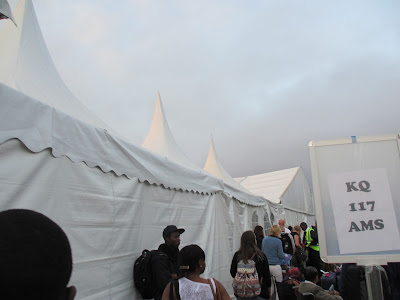On Wednesday 7 August 2013, Kenya's Jomo Kenyatta International Airport caught fire. The huge blaze destroyed the arrivals hall in what is the busiest airport in East and Central Africa, handling six million passengers a year.
I flew into Jomo Kenyatta airport early on the morning of 12 August. I didn't know what to expect, but was delighted to see some beautiful white tents as I emerged bleary-eyed and bewildered from my overnight flight.
 |
My fellow passengers on the tarmac
|
Immigration was in an enormous white tent. It was lovely to stand in much shorter queues than usual. The air was fresh and crisp. The light was natural. Much better than the usual sticky, smelly lines inside the airport's musty arrival hall, fluorescent lights casting ghastly flickers on people's tired and crumpled faces.
 |
| The immigration officials worked efficiently, with fiery lamps to keep them warm |
We then went into the 'baggage collection' area. It was more like a wedding party, with posh silken chairs for us to sit in.
 |
| The baggage collection area |
We waited in the 'wedding hall' until our bags were brought off the plane and lined up neatly outside on the tarmac, in different areas for different flights. We were then instructed to fetch our bags and take them to be x-rayed. The process was civilised, painless and pretty quick.
 |
| Jomo Kenyatta airport's 'baggage hall' |
Then came the frustrating bit. After our bags were x-rayed, we had to wait inside a small hall as a fierce-looking lady in a leopard print scarf re-checked everybody's passports in what seemed to be a deliberately slow manner. This caused a bottle-neck as trolleys overloaded with luggage banged into people's shins. I didn't see the point of this exercise, as our passports had already been thoroughly checked and stamped by the immigration officials.
After the over-zealous passport re-checking we emerged into the customs area. That went very quickly. We then spilled outside, where tiny tents had been set up for mobile phone companies, food shops and airport taxis. The blackened airport building stood behind us.
 |
The blackened airport building
|
Of course, there have been some negative effects from the fire, not least the alleged looting of cash and booze by police and airport workers: Police questioned over looting
And a big hit on airlines (especially Kenya Airways) and the wider economy: Will Nairobi fire hit Kenya's economy?
But, all in all, this was one of my most pleasant experiences at an airport for a long time. Fresh morning air, pretty white tents, posh silky chairs, and just one long and frustrating queue. Maybe other airports have something positive to learn from the Jomo Kenyatta fire.
The Departure Lounge
A few days after my arrival in Nairobi's 'tent city' airport, I passed through its 'departure lounge' on my way to Somaliland.
Once again, I was there very early in the morning. It still had the 'wedding party' look, but the atmosphere was a little sadder as many people were leaving their loved ones and their safari/ beach holidays.
One thing I forgot to mention in the earlier part of this blog is that all the airport staff I spoke to said they were very, very cold. Even those wrapped up in thick coats with hoods. Nairobi has been unseasonably chilly, and these poor people had to stand about outside, herding confused passengers from tent to tent. I felt especially sorry for the smartly dressed 'flight announcers', who came to the departure lounge to shout out the flights that were ready for boarding. Their thin red skirts and jackets did little to protect them from the cold.
 |
| Jomo Kenyatta International Airport departure lounge |
 |
| Inside the departure lounge |
 |
| The snack bar |
 |
| The toilet |
 |
| Washing facility |
As I left the airport, I wondered for how long those glossy white tents would stay glossy and white. It is going to take months (at least) to build new passenger halls. I imagine that once the shine wears off, the 'wedding party' airport might start to resemble a refugee camp.
 |
| Bad picture of the airport 'fire services' (what were they up to when the fire broke out?) |
 |
| Even worse picture of airport 'fire services' - nice red fire trucks which couldn't put out the fire. |
 |
| Mount Kenya (from my plane) in the early morning light |























































